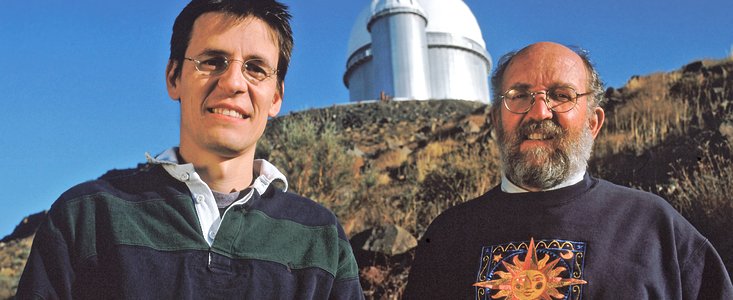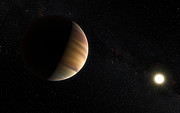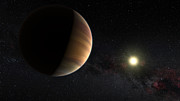Mitteilung
Nobelpreis für Physik 2019 für die Entdeckung des ersten Exoplaneten um einen sonnenähnlichen Stern verliehen
8. Oktober 2019
Michel Mayor und Didier Queloz wurden für die Entdeckung des ersten Exoplaneten um einen sonnenähnlichen Stern mit dem Nobelpreis für Physik 2019 ausgezeichnet. Mayor, Professor Emeritus der Universität Genf in der Schweiz, und Queloz, Professor für Physik am Cavendish Laboratory in Cambridge in Großbritannien, teilen sich den Preis "für Beiträge zu unserem Verständnis der Entwicklung des Universums und des Platzes der Erde im Kosmos" mit James Peebles, Albert Einstein Professor Emeritus of Science an der Princeton University, USA.
„Die ESO ist sehr stolz auf den Nobelpreis für Physik, den Michel Mayor und Didier Queloz erhalten haben, weil sie mit der Entdeckung von 51 Pegasi b und vielen weiteren Exoplaneten ein neues Gebiet der Astronomie erschlossen haben“, sagt ESO-Generaldirektor Xavier Barcons. „Die Partnerschaft, die die ESO mit Forschungseinrichtungen in den Mitgliedstaaten zur Entwicklung der anspruchsvollsten Instrumente pflegt, war der Schlüssel zu vielen dieser Entdeckungen. Insbesondere HARPS am 3,6-Meter-Teleskop der ESO an der Sternwarte La Silla und seit kurzem ESPRESSO am Very Large Telescope am Paranal sind weltweit führend bei der Radialgeschwindigkeitssuche von Planeten, die Sterne außerhalb des Sonnensystems umkreisen. Die ESO feiert, dass zwei herausragende Mitglieder ihrer wissenschaftlichen Gemeinschaft, mit sehr starkem Engagement für die ESO und einer sehr erfolgreichen Nutzung unserer Einrichtungen, diese wohlverdiente Anerkennung erhalten haben.“
Die Entdeckung von 51 Pegasi b, dem ersten Exoplaneten, der jemals um einen sonnenähnlichen Stern herum gefunden wurde, wurde am 6. Oktober 1995 von Mayor und Queloz bekannt gegeben, die ihn mit dem ELODIE-Spektrographen im Observatoire de Haute-Provence in Frankreich entdeckten. Die Entdeckung revolutionierte die Astronomie, indem sie ein völlig neues Feld eröffnete und neue Instrumente zur Entdeckung und Charakterisierung von Exoplaneten einsetzte. Der Erfolg von ELODIE führte zum Bau von CORALIE, einer verbesserten Version von ELODIE, die auf dem 1,2-Meter-Schweizer-Euler-Teleskop am La Silla Observatorium der ESO in Chile montiert ist. Die Erkenntnisse aus dem Bau und Betrieb dieser beiden Instrumente flossen in die Entwicklung des Planetenjägers HARPS (High Accuracy Radial velocity Planet Searcher), der 2003 in Betrieb ging. Das Licht von 51 Pegasi b wurde auch von HARPS beobachtet, wobei zum ersten Mal spektroskopisch sichtbare Strahlung, die von einem Exoplaneten reflektiert wird, nachgewiesen wurde.
Mayor und Queloz waren maßgeblich an der Entwicklung der revolutionären Radialgeschwindigkeitsmethode beteiligt, die heute noch für die Suche nach Exoplaneten genutzt wird. Diese Methode sucht nach einer winzigen Hin- und Herbewegung des Zentralsterns, da sich die Richtung der Gravitationskraft von einem (unsichtbaren) umlaufenden Exoplaneten ändert. Wenn sich der Stern auf uns zubewegt, ist sein Spektrum blauverschoben, und entsprechend rotverschoben, wenn er sich von uns entfernt. Auf der Suche nach regelmäßigen Verschiebungen im Spektrum des Sterns – und damit der Messung von Geschwindigkeitsänderungen – können periodische Effekte durch den Einfluss eines Begleiters beobachtet werden.
Sowohl Mayor als auch Queloz arbeiten seit langem mit der ESO zusammen und waren in den Verwaltungs- und Beratungsgremien der Organisation tätig. Sie sind sehr erfahrene Beobachter, die an Hunderten von Beobachtungsläufen bei der ESO mit einer Vielzahl von Instrumenten teilgenommen haben. 1996 gedachte die ESO dem bahnbrechenden Artikel von Queloz und Mayor von 1995, indem sie es in eine Zeitkapsel legte, die noch immer in der Wand des VLT-Gehäuses vergraben ist. Es ist ein Beweis für die Gründlichkeit und Zielstrebigkeit ihrer Arbeit, dass ihre Entdeckung über zwanzig Jahre später mit einem Nobelpreis für Physik ausgezeichnet wird.
Links
Kontaktinformationen
Bárbara Ferreira
ESO Public Information Officer
Garching bei München
Tel: +49 89 3200 6670
Email: pio@eso.org
Über die Mitteilung
| ID: | ann19049 |



